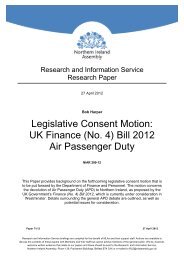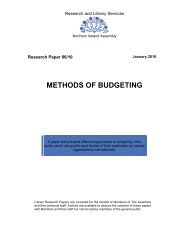Written Answers to Questions - Northern Ireland Assembly
Written Answers to Questions - Northern Ireland Assembly
Written Answers to Questions - Northern Ireland Assembly
Create successful ePaper yourself
Turn your PDF publications into a flip-book with our unique Google optimized e-Paper software.
Friday 20 July 2012 <strong>Written</strong> <strong>Answers</strong><br />
also provides for drilling an exploration well and associated construction and engineering works,<br />
including hydraulic fracturing, but these are subject <strong>to</strong> Planning Permission and other consents from<br />
DETI, HSENI and others.<br />
Applications <strong>to</strong> undertake construction works, exploration drilling and hydraulic fracturing would be<br />
subject <strong>to</strong> the full rigour of the Planning system including an Environmental Impact Assessment. Drilling<br />
a borehole is subject <strong>to</strong> the Borehole Sites and Operations Regulations (<strong>Northern</strong> <strong>Ireland</strong>) 1995:<br />
under these Regulations companies must notify HSENI 21 days in advance of the commencement of<br />
operations and comply with drilling specific and general health and safety regulations. As a statu<strong>to</strong>ry<br />
consultee in the planning process HSENI has the opportunity <strong>to</strong> make recommendations on the<br />
proposed drilling operations, including compliance with internationally accepted standards. Many<br />
elements of the proposed drilling operations would be subject <strong>to</strong> environmental and other legislation,<br />
and moni<strong>to</strong>ring programmes may be included under these regula<strong>to</strong>ry regimes. DETI can include specific<br />
conditions (e.g. specifications for well design and construction) as part of its well consent. DETI has<br />
the powers <strong>to</strong> inspect the drilling operations and recover the costs from the Licensee.<br />
During the exploration phase DETI will only issue Consent <strong>to</strong> Drill approval if the Licensee has<br />
demonstrated that it has already obtained all the other statu<strong>to</strong>ry permissions that it requires <strong>to</strong> carry<br />
out its operations, and it has satisfied the Department that its proposed operations are technically<br />
acceptable and will not have a significant adverse impact on the environment.<br />
If exploration drilling is successful and a company wishes <strong>to</strong> develop the shale gas resources in its<br />
licence area it would need <strong>to</strong> submit a development programme for approval by DETI. This development<br />
programme would also require a Planning Application and accompanying Environmental Impact<br />
Statement. The planning process would involve consideration of a range of issues associated with<br />
the proposed development, including ecology, water resources and quality, air quality, the potential<br />
economic benefits, the potential for impacts on other industries, and the effects on the community.<br />
Projected Impact on Tourism from Extracting Shale Gas by Hydraulic Fracturing<br />
Mrs Overend asked the Minister of Enterprise, Trade and Investment what is the projected impact on<br />
<strong>to</strong>urism from extracting shale gas by hydraulic fracturing.<br />
(AQW 13693/11-15)<br />
Mrs Foster: The integrity of the natural environment is an important fac<strong>to</strong>r in the future development<br />
of the <strong>to</strong>urism sec<strong>to</strong>r. Should any company apply <strong>to</strong> DETI <strong>to</strong> drill a well for hydraulic fracturing, the<br />
impact on existing industries such as <strong>to</strong>urism would be fully assessed when considering any planning<br />
application.<br />
Exploration for Extracting Shale Gas by Hydraulic Fracturing<br />
Mrs Overend asked the Minister of Enterprise, Trade and Investment for an estimated timescale for the<br />
completion of exploration for extracting shale gas by hydraulic fracturing; and <strong>to</strong> outline the next steps<br />
once the exploration is complete.<br />
(AQW 13694/11-15)<br />
Mrs Foster: The exploration stage of a shale gas development project may last between five and<br />
ten years although this phase would also include an assessment of the commercial viability of the<br />
proposed development through extended gas flow testing and, as such, may be considered the<br />
equivalent of the exploration and appraisal stages of a conventional oil or gas development.<br />
The timescale for the completion of exploration of shale gas resources depends on the availability of<br />
existing information, the timeframe for the exploration work programme included as a Schedule <strong>to</strong> the<br />
petroleum licence and the time required <strong>to</strong> obtain the necessary statu<strong>to</strong>ry consents and complete the<br />
exploration phase.<br />
Provided the exploration, including the extended testing of gas flow rates, yields favourable results the<br />
next stage is for the company <strong>to</strong> prepare a development programme for the production phase of the<br />
WA 497






